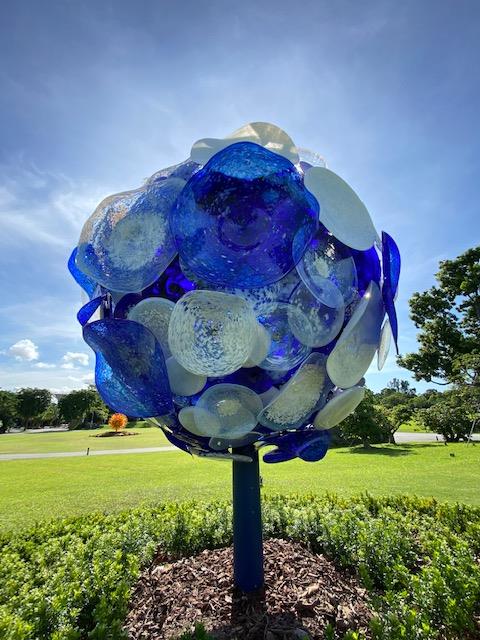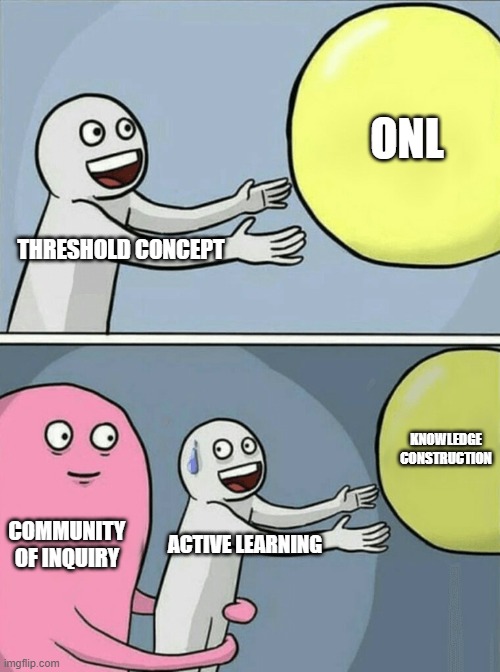 The last group meeting of PBL6 shows us all deep in thought!
The last group meeting of PBL6 shows us all deep in thought!
The end of ONL211 coincided with Singapore re-entering Phase 2 of pandemic preparedness as the country grappled with community spread and unlinked cases of people infected with Sars CoV2.
Suddenly, I had to convert the planned Narrative Medicine workshop on 17 May which kicked off the summer school and the capstone retreat on 31 May into an online format. Here was my chance to practise what I had learned during ONL211!
I recalled the lessons shared by a fellow participant on “Death by Powerpoint” and how my ingrained habit of making wordy slides had to perish. It will be an ongoing work to distil information and consider how best to present it to engage learners.
Recalling Topic 4 which I had found particularly challenging but helpful in forcing me to consider the design of a course to engage and motivate students, I incorporated elements of a community of inquiry and active learning into these two sessions.
The first part of my Narrative Medicine workshop was a lecture to introduce the topic of honouring patients’ stories. In the second part, students moved into small breakout groups to read a story. They were invited to consider the thoughts and emotions evoked and provoked, following which they contributed to a word cloud using the mentimeter and then created a collective meme depicting their takeaways from the story. The contemplative session that followed from this was designed to lead students to consider their personal stories and what it meant to honour these. A reflective space was created for musings on their lives, experiences, relationships, choices and what could be their unconscious narratives using music, photographs, poetry and guided questions.
The design of my Cultivating Compassion retreat had to change from a nature walk where students would glean inspiration to answer my questions on seeds that had been sown during the summer school. Instead, I used a video clip where the young female author who had written “Between Two Kingdoms: A Memoir of Life Interrupted” spoke on her life changing experience with her elderly physician in the early months of her diagnosis with leukaemia. This was to reinforce my lesson on empathic engagement between the physician and the patient (from the Narrative Medicine workshop) and highlight physician identity and the use of self as a therapeutic instrument.
A meditation practice was built into the retreat to introduce students to self-compassion. In engaging the mind and body through a meditation practice, I was role-modelling the use of a mindfulness tool to address feelings of insecurity and unworthiness which can be used to help one cope with the pressures of life and studies.
The concept of gratitude was raised to weave in the various domain components the students had explored, including the poor, vulnerable, disabled, elderly, youth and global health. The final portion was based on steps the students would take in facing the future as they realised their gifts and the lessons learnt in the summer school.
 One of Dale Chihuly’s glass creations , entitled Moon, at the Gardens by the Bay ” Glass in Bloom” exhibition.
One of Dale Chihuly’s glass creations , entitled Moon, at the Gardens by the Bay ” Glass in Bloom” exhibition.
To me, it embodies connectivism, which has been demonstrated so well throughout ONL211.
The ONL journey has been a rich feast of learning in spite of the challenges of extensive reading requirements, time management and attending the webinars as well as the twice weekly online group meetings. Many firsts for me. I have used Google Docs to work asynchronously with my friends in Sweden, Finland, Poland and Singapore. I have blogged and enjoyed the creative process of marrying thoughts, reflections, words and photographs. Reading others’ reflections and their groupwork and presentations was a wonderful learning resource, albeit Iimited by time. I succumbed to creating a twitter account (as I did not want to lose out on any learning). Tweeting was not as hard as I had imagined it would be. And I created a meme!

ONL has been about abundant learning spread out over time and space with PBL6, a wonderfully diverse group of friends whom I would not otherwise have made and getting my head around the many tools and the thorny issues we came upon on our journey to create the group presentations. It has opened a new world of pedagogy in education, a topic which I had not found accessible previously, perhaps because of preconceived notions that this was dry and boring. The problem-based learning format of ONL, with its open and collaborative design was just the right thing I needed to unfreeze my mindset during the pandemic.
The experience of learning in ONL has stimulated me to think about the personal learning networks that I am part of and to consider being more intentional in cultivating these.
Next steps will be to practise what I have learnt. Consider the learner’s perspective. How do I make the materials more engaging and interactive? Implement active learning, build a community of inquiry and be bold in designing blended learning, when the time comes for teaching to resume in physical spaces 